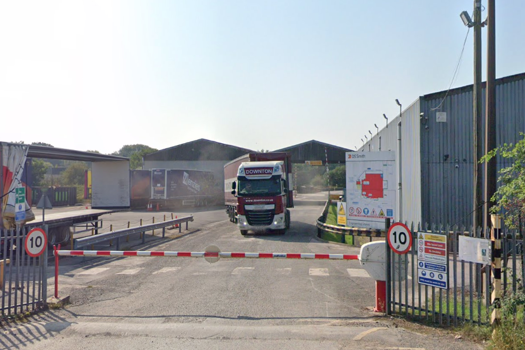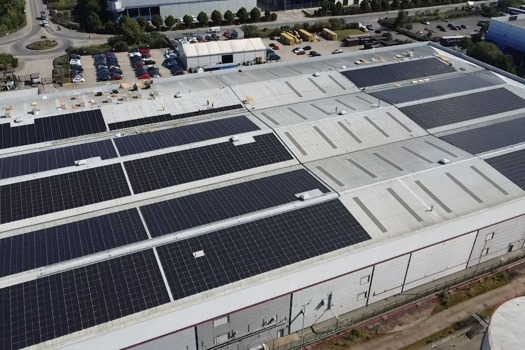In the past couple of decades it has astutely moved into digital hybrids working with third parties that know how to build inkjets but need to mount them on proven media transports with modular printing and finishing units.
Although the company has been around for the best part of a century, its early years and origins are a bit obscure, even to the current owners. “1920 is the earliest record we can find, as the company was originally formed as part of the Imperial Tobacco group,” says managing director James Boughton. Flexo at that time depended on rubber plates and aniline inks and was regarded as a low-cost, low-quality alternative to gravure for packaging work.
Between 1950 and 1960 the press operation was acquired by a company called Lonsdale and sold presses under the Hall Kelly brand. In 1982 the press range was acquired by Edale Ltd, which had been the official distributor, which then used its own name. 1988 saw Edale acquired by Butterfly Holdings, its current owner, which is registered to the same address.
Boughton joined the company as a graduate engineer, and worked his way up to the top job 12 years ago.“Edale have produced a lot of machines over the years that to this day are still in operation and working well,” he says. “However, in the last 10-15 years the product range has changed dramatically. All our machines are designed and manufactured at our head office and the software is also developed and designed in-house. Longevity of life is directly connected to build quality and use of highly respected manufacturers of outsourced components and equipment.”
Today the company occupies a 5,570m² purpose-built factory in Whitely, Hampshire, that was designed by the current management team. It is split into three units: assembly, build and component manufacture. The staff of 70 are mostly based in the building, although a few work externally A new sales engineer in India has recently been appointed.
Global player
The firm’s turnover is £10m and it operates worldwide, exporting 80% of its products. “We have a global sales and aftersales support network with a team of agents and distributors,” says Boughton. “Successful areas have included India, US and the Middle East and more recently Africa. “
He describes the customer market as ranging “from medium-sized owner-managed companies to large conglomerates who appreciate the high levels of automation that is standard on our equipment. Edale are a very approachable company who are willing to share knowledge and experience freely and this is a large part of our success.”
The company’s modern range started with the Alpha and Beta presses, launched in 1999 to 2000, but they were replaced by the all-new FL series, the FL3 in 2011 and FL5 in 2014. Boughton explains the difference: “Our products really come under two domains, the FL3 which is our label press and the FL5 which is designed for cartons and film.
“Both these products appeal to our customers due to their flexibility. The FL3 can handle substrates from 12 to 450 microns and the FL5 from 12 to 600 microns without any changes to the press. The FL5 with in line flatbed die-cutter gives true single-pass production of finished cartons. Together with our unique Uniprint print head design, which is common on both FL3 and FL5, this gives cartons which are comparable to the traditional offset methods both in print and diecut quality.”
Using direct servo drives on each independent print converting module means that each can be independently tuned to its specific function or for overall tension control in the press. “This allows for easy upgrade with additional print stations and options, something line shaft machines find more difficult,” Boughton says.
Flexo has gone through a quality and productivity revolution in the past decade, partly thanks to new plate and anilox roll making technology. Edale has kept up by developing its own AIIR technology, standing for ‘autonomous, inking, impression and registration’. It is a camera-based, closed-loop inspection system that will automatically bring the print into register and maintain it without operator input.
Edale’s FL printheads do not have a gear between the print plate and the impression roller, eliminating banding for improved print quality. Automated pre-register uses magnetic sensors to calculate the required location of the print roll. Pre-setting allows the next job to be set up on any unused colour units while the press is running on the first one.
Edale has also transitioned successfully to the digital era, adapting its presses to accept third party inkjet print engines. “The buzzword in the industry seems to be hybrid printing,” says Boughton. “In fact Edale built the first digital/flexo hybrid over 15 years ago and this is really where our abilities and skills in integration began. The recent partnership with FFEI with the Graphium and also the Labelstream 4000 in collaboration with Canon Océ, show that Edale has become a preferred integrator for many digital engine suppliers. These presses can be configured the same as a flexo press with print stations and options including delam/relam, turn bar and cold foil and also a digital unit.”
This arrangement suits all sides well – the inkjet developers don’t have to invest time and money in developing and building their own transports and can offer hybrid systems with well-proven printing and finishing components. From Edale’s point of view it gives it a wider pool of customer companies with their own sales channels.
“All our design, mechanical, electrical and software is done in-house. This is essential to carry out any integration project,” says Boughton. “Our customers can sit and discuss the whole process from conception to reality with what is in effect one supplier. We have been offering this service for nearly 20 years and as such have a vast internal knowledge of all aspects of packaging, which helps in getting things correct first time.
“The largest web transport we have designed for a digital head is 1.6m wide.”
Edale first developed this ability for the Agfa Dotrix M, introduced at Ipex 2002. This took the existing 650mm width Dotrix UV inkjet print engine and integrated it with an Edale roll-fed chassis, with the option for inline flexo and finishing units. It was never a big seller but it paved the way for today’s commercially successful narrow and medium wed width hybrid label presses.
This was followed by work with FFEI to develop the Graphium medium width (450 mm) six-colour UV inkjet hybrid printer, launched at LabelExpo in 2015. FFEI builds the inkjet engine in Hemel Hempstead, based on Xaar printheads and a single control system handles all the digital and analogue processes.
Edale and FFEI then worked in partnership with Canon to develop the Canon Océ LabelStream 4000, announced last year and shipping now – this is essentially an updated, improved and faster version of the Graphium engine with an extensive range of flexo and finishing options from Edale. Apart from the web transport mechanism, Edale offers up to 10 fast-change inline flexo units, incorporating AIIR, with options including a turn bar, delam/relam, cold foil, lamination and varnish units. Canon Océ brings its worldwide channels and marketing clout to the party.
Digital development
Edale has also developed its own digital option, the EFX Print Bar, which uses a choice of Xaar 1003 heads in widths from 140-560mm in 70mm increments. Boughton says this “is a high-precision UV based inkjet system designed to digitise print finish and embellishment. The print bar is available in three configurations, including a digital white, digital cold foil and a high build varnish. It can be included on an Edale press or retrofitted to an existing web fed press.” Inks available include black, white, CMYK (one colour per bar) and cold foil adhesive.
Another collaboration was with AB Graphic to develop the Digicon 3000 inline finishing system for mid-width digitally printed flexible packaging and labels, launched in 2013. This can run with 400 to 762mm web widths (so it’s suited to the HP Indigo 20000), at up to 100m/min. It handles rotary and semi-rotary printing and die-cutting, laminating, slitting, decoration and perforation, with optional electron beam curing as an alternative to UV.
As it enters its 100th year, Edale seems well placed to take advantage of the packaging and labels sector’s tendency to maintain demand even in difficult times, while moving with the times that have seen flexo emerge as a high quality process with ever-increasing digital integration.
STAR PRODUCTS
The FL3 flexo press
The FL3 press is for 350-430mm web widths and can run from 5-200m/min. It can be configured with up to 12 flexo colour units and three inline die-cutting stations, plus a 330mm screen unit as well as other options including an FFEI Graphium UV inkjet engine. Edale says the web width range allows label printers to diversify into new growth markets in flexible packaging, such as sleeves, wrap around labels, pouches and sachets.
The FL5 flexo press
The FL5 is available as a 570mm web width press for flexible packaging running at up to 222m/min, but also as the FL5 Carton with feed and gearing modifications to accept 510mm wide board up to 600microns. It features a jumbo unwind unit and inline flatbed die-cutting, creasing and stripping, when it runs at 90m/min. FL5 presses feature a rail system to enable options such as laminating, turn bar, foiling and screen to be moved between units.










